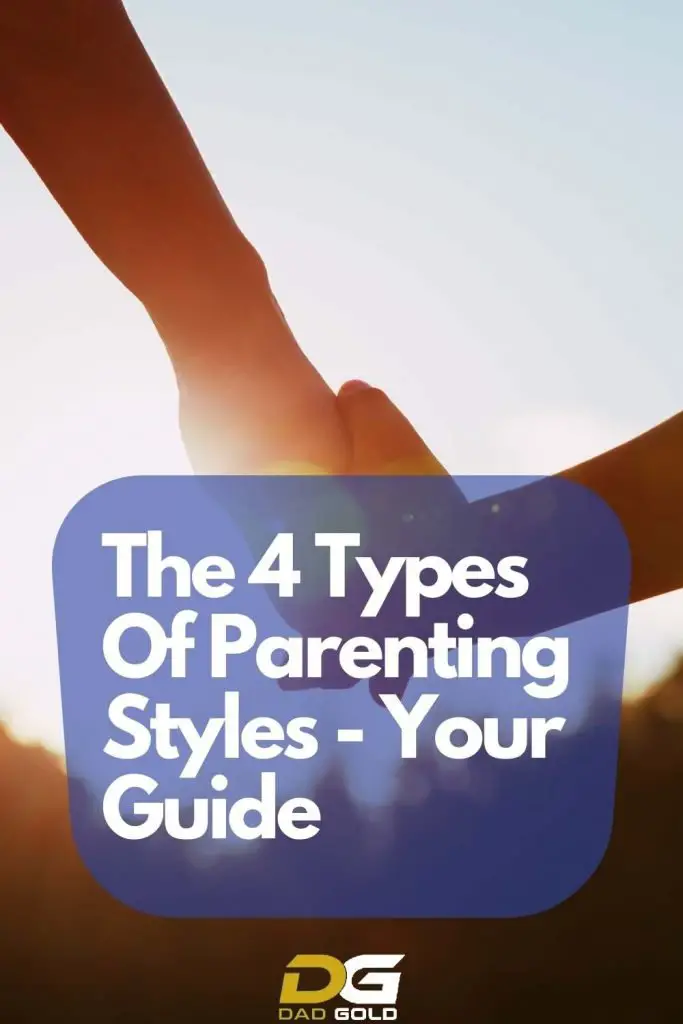Your parenting style can greatly affect how your kids grow up.
In this post, we will look at the 4 parenting styles to see how they impact your child’s development.

What Is Parenting Style?
Styles of parenting can differ drastically.
Parenting styles commonly recognized by psychologists stem from the theory by developmental psychologist Diana Baumrind. Children in her studies exhibited certain behaviors that fall into the response of three types of parenting.
The fourth came from Maccoby and Martin (1983), who grew Baumrind’s theory to develop a fourth.
Parent styles have varying effects on children and result in the two dimensions that categorize these: demandingness and responsiveness, by which each style crosses over to the other in various ways.
What is the right balance to achieve optimum parenting?
Let’s take a look.
Responsiveness
To be responsive as a parent is to react with sensitivity and emotion, tending to their children’s needs and ensuring they are nurtured well.
Parents are usually very accepting and open to their children’s development and the following needs. Usually absent from authoritarian parents and permissive parents.
Demandingness
A demanding tone is led with more controlling connotations, seeking ways to demand emotions or outcomes.
It comes with tighter boundaries and rules and usually lacks uninvolved parenting or permissive parents.
What Are The Types Of Parenting Styles?

Let’s break down the four types of parenting styles.
Each comes with an interesting insight into how styles differ and the effects these styles have on children.
The four types of parenting styles are:
- Authoritarian parenting
- Authoritative parenting
- Permissive parenting
- Uninvolved/Neglectful parenting
1. Authoritarian Parenting Style
High demandingness/Low responsiveness
The demand from an authoritarian parenting style differs vastly from its similarly-named authoritative.
These similar words are drastically diverse regarding styles, with the authoritarian style resulting in a much more controlled environment with little room for two-way respect and communication.
With authoritative parenting, children are led to a much more assertive level of parenting, with a level of ‘my way or the highway’ from parents.
The result of anything different comes with harsh punishment, and enforcing control. Children are led blindly to obey rules and will sadly lack the self-esteem to ask questions.
Pros and Cons of The Authoritarian Parenting Style
As a result of having authoritarian parents, we can see those same levels of high expectations, but ones that are not met with compromise or understanding.
Children are likely to feel insecure and perform poorer in school or in social situations. Their coping mechanisms deplete and mental health issues are more likely to arise due to these parenting styles.
Children in these settings are more likely to suffer from anxiety or develop an increase in aggressive behavior, which becomes harder to control as they get older.
Authoritarian parenting can usually stem from how their own parents raise an adult. This doesn’t excuse the authoritarian approach as one of the parenting styles detrimental to children.
2. Authoritative Parenting Style
High demandingness/High responsiveness
Authoritative parents blend encouraging mature behavior and achievement through high expectations, with the striking balance of being responsive and warm.
Boundaries are often created through honest discussions and clarity. Reasoning is the backbone of any explanation, as children are nurtured in growth, beliefs, and morals.
Learning is a healthy mix of absorbing information, asking questions, and finding answers, which results in excellence in education.
With authoritative parents, Clear rules are blended with affection, and children are encouraged to be independent decision-makers, with knowledge of consequence and the ability to problem-solve.
Pros and Cons of The Authoritative Parenting Style
Children are known under this parenting style to perform better, with higher social skills.
Their academic achievements are as high as their self-esteem, and they are secure in themselves with a strong and stable level of mental health.
Authoritative parents have a balanced style, and any different parenting style does not appear to produce such positive, level-headed children.
Authoritative parents raise strong children.
3. Permissive Parenting Style
Low Demandingness/High responsiveness
Reluctant to enforce boundaries or set rules, permissive parents are warm but struggle with the word ‘no.’ They are lenient with punishment, instead preferring the more indulgent side of parenting to come to the forefront.
Think, ‘My child can do no wrong.’
Permissive parenting is often perceived as ‘the parent wanting to be friends with their children’, and whilst it is a fine idea to have a great rapport and share things in common, the distorted lack of adult/child rules doesn’t offer much clarity in terms of structure.
Pros and Cons of The Permissive Parenting Style
Lack of boundaries with a child will ultimately raise a person who has no concept of such. This can be the leading cause of problematic relationships, personal or professional.
It can be harder to make friends with lower levels of social skills and egotistical traits.
Whilst parents may be warm and caring, these parenting styles don’t offer children much opportunity to grow and understand the repercussions of poor behavior.
4. Uninvolved/Neglectful Parenting Style
Low demandingness/Low responsiveness
Uninvolved parents who neglect their children neither set high standards nor firm boundaries.
Disassociated with their children’s lives as much as they are disinterested, they offer very little in terms of a warm, nurturing environment where their children are loved and validated.
Uninvolved parents’ parenting styles leave a lot to be desired. Often having experienced abuse as a child or with mental health issues themselves, these parents may repeat history.
Pros and Cons of The Uninvolved Parenting Style
Children who are permissive or permissive parents raise will encounter more problems, including the inability to control or self-regulate their emotions, usually stemming from not recognizing them in the first instance.
As a result, children can behave more impulsively and usually to a negative detriment.
Children suffer from low self-esteem as they have neither the knowledge of succeeding or being recognized for doing well.
As a result, they will likely retreat, with parents being unaware or unbothered by the consequences of their uninvolved parenting style.
Conclusion
How you parent is paramount to a child’s growth and development. They have no choice where they live and raise them when you bring them home from the hospital.
Your style of parenting is crucial in how they present.
The best-selling book, Kind Yet Firm: Discipline Your Toddler the Positive Parenting Way, is a great read about finding and practicing that balance between boundaries and love.
PsychCentral has also created a test for you to take to find out your own personal parenting style. You can find it here.
Parental styles can sometimes fluctuate between two different approaches. This can depend on how each parent approaches situations, but it is evident which style molds the healthiest and most positive children.
However you choose to parent your children, you should always have a list of consequences for their actions.
A diverse and enriching range of practices produces well-balanced people.










